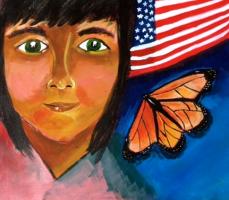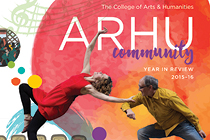By Dina Shafey Scott & Diana Guelespe
Scholars from around the country whose research focuses on the lived experiences of historically underrepresented minority (URM) groups gathered this past summer for the 2nd Annual Intersectional Qualitative Research Methods Institute (IQRMI), held at the University of Maryland (UMD). Organized by UMD’s Consortium on Race, Gender and Ethnicity (CRGE), the week-long institute brought together an interdisciplinary group of scholars with one common interest— to research critical social problems using an intersectional approach.
This year 20 scholars attended a series of daily interactions, seminars and post-institute activities focused on enhancing qualitative research and writing skills, developing critical intersectional perspectives for designing and interpreting research and developing navigational skills to successfully negotiate academic career paths. Scholars represented a variety of academic disciplines, and discussed the importance of integrating the arts and humanities into their research to address social justice issues.
“Understanding privilege requires that we see that all oppression has a starting point and is based in history,” said Nishaun T. Battle, assistant professor of sociology and criminal Justice at Virginia State University.
Battle has worked on understanding and promoting social justice for ‘at risk’ juveniles and spoke of her cross-disciplinary partnership with the humanities.
“I have worked and collaborated with women’s studies and history professors and draw from the work of Elsa Barkley Brown, history and women’s studies professor at Maryland,” said Battle.
Sponsored by the New Connections Program, a national program of the Robert Wood Johnson Foundation, the Maryland Population Research Center, and the Office of Diversity and Inclusion at UMD, the institute offers training that uniquely focuses on qualitative research methods that incorporate discussions at the intersections of race, gender, class, ethnicity and other dimensions of inequality, especially cultivated through the lens of URM scholars.
The institute took place as the country was grappling with the controversial deaths of 37-year old Alton Sterling in Baton Rouge Louisiana and 32-year old Philando Castile in St. Paul Minnesota, both dying at the hands of law enforcement officers. It became a space to share thoughts and feelings, as often these faculty are the only people of color in their departments and for students to turn to in these times.
“Schools need to place more emphasis on humanities to help in healing,” said Laurie Nsiah Jefferson, senior lecturer at the Heller School for Social Policy and Management at Brandeis University.
One attendee, Kunmi Sobowale, a resident at Yale School of Medicine at Yale University, reached out to the group after the institute to follow up and share how he was “helping patients to process emotions and fears” surrounding the events, and “discussing the long lasting effects on their mental health.”
“I am trying to set up discussion(s) and make these topics a standard practice and part of medical training,” said Sobowale.
That act was one of many resulting from the work of the group. They continue to see the institute as a safe space where they were able to share their thoughts and feelings with the group and collaborate in publications.
“What an amazing group of brilliant and compassionate scholars,” said Ruth Enid Zambrana, director of CRGE, “struggling with social issues of grave concern, such as African American men and women in prisons, food insecurity among the poor and Latino immigrant groups, caregiving among other concerns. It was moving to observe them feel safe, secure in their belonging and trust to reach out for help.”
Together the attendees drafted a collective statement in response to the events to express their sadness in the loss of community and law enforcement officers, while noting historical and structural injustices still present in society.
“We Lift Up Love and Reject the Burden of Hate: To build a more empathetic community, we must courageously listen and make an honest effort to face our fears and pain, and consciously commit to boldly take action for transformative change in this country. Without this change we will inevitably face continued violence and loss of the skills and talents of those we have lost.”
The next IQRMI will be held on June 4-9, 2017. For more information or to apply, please visit www.crge.umd.edu/IQRMI. The deadline for application is January 9, 2017.












